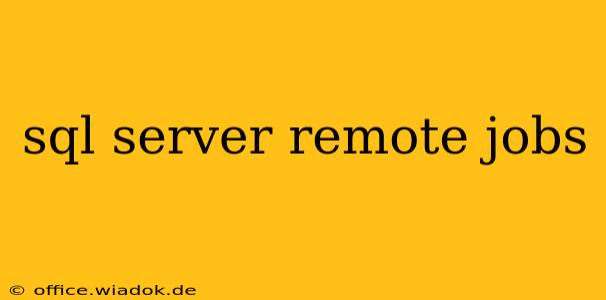The demand for skilled SQL Server professionals remains consistently high, and the rise of remote work has opened up a world of opportunities for database administrators, developers, and analysts. This guide will help you navigate the landscape of SQL Server remote jobs, providing insights into where to look, what skills are in demand, and how to optimize your job search.
Understanding the Remote SQL Server Job Market
The remote job market for SQL Server expertise is dynamic and competitive. Companies across various industries—from tech giants to smaller startups—rely heavily on SQL Server databases. This reliance fuels a consistent need for experienced professionals who can manage, maintain, and optimize these crucial systems. The shift towards remote work has only amplified this demand, making remote SQL Server roles increasingly prevalent.
Types of Remote SQL Server Jobs:
- Database Administrator (DBA): Responsible for the performance, security, and integrity of SQL Server databases. Remote DBAs often utilize remote access tools to manage servers and troubleshoot issues.
- SQL Server Developer: Focuses on developing and maintaining database applications using T-SQL and other related technologies. Remote developers collaborate with teams using various communication tools.
- Data Analyst: Extracts, cleans, and analyzes data from SQL Server databases to support business decisions. Remote data analysts frequently use data visualization tools and reporting software.
- Cloud Database Administrator: Manages SQL Server instances hosted on cloud platforms like Azure or AWS. Requires strong cloud computing knowledge in addition to SQL Server expertise.
Essential Skills for Remote SQL Server Jobs
Beyond core SQL Server skills, remote roles often require a broader skillset encompassing:
Technical Skills:
- T-SQL Proficiency: A deep understanding of T-SQL programming, including stored procedures, functions, views, and indexes.
- Database Design: Ability to design efficient and scalable database schemas.
- Performance Tuning: Expertise in identifying and resolving database performance bottlenecks.
- Security Best Practices: Knowledge of implementing security measures to protect sensitive data.
- Backup and Recovery: Experience with creating and restoring database backups.
- High Availability and Disaster Recovery: Understanding of techniques to ensure database uptime and recover from failures.
- Cloud Platforms (Optional but advantageous): Familiarity with Azure SQL Database, AWS RDS for SQL Server, or other cloud-based SQL Server solutions.
- Data Modeling: Ability to create effective data models that represent business requirements accurately.
- Data Warehousing and Business Intelligence (BI): Experience with ETL processes, data warehousing concepts, and BI tools is often highly valued.
Soft Skills:
- Excellent Communication: Effective communication is crucial in remote environments, requiring clear and concise written and verbal skills.
- Problem-Solving Abilities: The ability to independently diagnose and solve technical problems is essential.
- Self-Management: Remote work requires strong self-discipline and the ability to manage your time effectively.
- Collaboration Skills: Working effectively with remote teams requires strong collaboration skills and the ability to utilize collaborative tools.
- Proactive Approach: Anticipating issues and proactively addressing potential problems.
Where to Find Remote SQL Server Jobs
Several resources can help you find remote SQL Server job openings:
- Job Boards: Indeed, LinkedIn, Monster, and Dice are excellent resources for searching remote positions. Utilize keywords like "remote SQL Server DBA," "remote SQL Server developer," or "work from home SQL Server analyst."
- Company Websites: Check the career pages of companies known for their remote work policies.
- Networking: Connect with other professionals in the SQL Server community through online forums, groups, and conferences. Networking can lead to unadvertised opportunities.
- Recruitment Agencies: Specialized IT recruitment agencies often have access to exclusive remote job postings.
Optimizing Your Job Search
To increase your chances of securing a remote SQL Server job, consider these tips:
- Tailor Your Resume and Cover Letter: Highlight relevant skills and experience, emphasizing your ability to work independently and collaboratively in a remote setting.
- Showcase Your Portfolio: Include projects that demonstrate your SQL Server skills and expertise.
- Practice Your Interview Skills: Be prepared to answer questions about your remote work experience and your ability to manage your time effectively.
- Understand Remote Work Culture: Familiarize yourself with the norms and expectations of remote work environments.
By understanding the remote SQL Server job market, mastering the required skills, and effectively navigating your job search, you can increase your chances of landing your dream remote position. Remember that persistence and a proactive approach are key to success in this competitive field.

